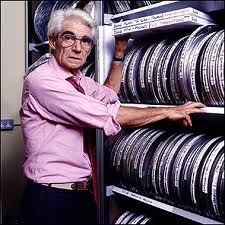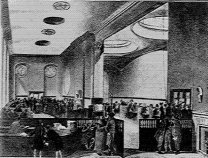Posted by Dr. Andrew Calcutt
Categories: Dr Andrew Calcutt / Guest Writers / History of PR / Media issues
13 June 2011
2 comments
Hairy Days for Journalism
On the night of Wednesday 8th June, Alastair Campbell issued a stark warning to British journalists. Speaking ‘in conversation’ with Bill Hagerty, editor of British Journalism Review, New Labour’s former spin doctor warned that journalism risks losing even more integrity by shifting its ‘centre of gravity’ further towards celebrity culture.

Lindsey Hilsum
Campbell issued this warning at the University of Westminster, following a short ceremony in which the Charles Wheeler Award for Outstanding Contribution to Broadcast Journalism – in memory of the distinguished BBC correspondent who died in 2008 – was presented by his widow, Lady Dip Wheeler, to Channel 4 News reporter Lindsey Hilsum. In her acceptance speech, Hilsum remembered a time when Wheeler had praised her reporting and she ‘walked on air’ for days afterwards. Following in Wheeler’s footsteps, Hilsum’s reputation rests on coverage of world historic events.
The event was attended by the Mayor of London, Boris Johnson, who arrived late.
The Charles Wheeler Award not only recalls its eponymous hero, it also calls up journalism’s preferred image of itself – humane and high-minded, accurate and analytical. Wheeler himself really did embody these qualities: he took accountability to the public so seriously that even in retirement this world-renowned reporter had himself openly listed in the London phonebook as ‘Wheeler, Charles: Journalist’.
Meanwhile, on the streets outside the award ceremony, the day’s headlines added strength to Campbell’s dire warning.

- Charles Wheeler
The biggest-selling morning papers had led with further personal details about ‘sex cheat’ Ryan Giggs. The Manchester United footballer was said to have undergone follicular replacement therapy following stress-related hair loss.
Later in the day, the London Evening Standard plumped for the personal presence of Mayor Boris Johnson at a police drugs raid in Tottenham – this made the front page. When a suspected drug dealer awoke to find the Mayor of London in his flat, along with police officers, he is reported to have said: ‘What the f*** are you doing here?’
‘I don’t think this chap was pleased to see me’, the Mayor later said. But Johnson must have been pleased that his celebrity status was affirmed by media coverage associating him with decisive police action.
The hairs on Giggsy’s head were headline news. Imagine the front page splash (and the follow-up pages inside) if CSI-style reporters had bagged the pubes from his mistresses’ beds! But the forensic fetish for personality goes way beyond philandering footballers and their ‘wagms’ (‘m’ added for mistresses). It extends to public officials such as Johnson, now known much less for their politics and far more for their personal presentation (in BoJo’s case, the mop of tousled, blond hair which says ‘public school but people-friendly’).
The way his hair is distressed is BoJo’s mode of address: I’m half-way between Hugh Grant and Ron Weasley, and it just so happens I head-up the government of London. Celebrity is the medium, there’s not much message besides, and many journalists seem happy to carry it – the lighter the better.

- BoJo is an “hairlarious” politician
In the same vein, subsequent press coverage of the Charles Wheeler Award ceremony featured the banter between the two biggest celebrities in the room. From the stage, Campbell joshed Johnson for arriving late and for going out early on the drugs raid. Though dedicated to the public role of journalism, even this event was partly colonised by the media-bred, scandal-fed, all-embracing, self-referencing cult of personality.
So Campbell’s warning could not have been more timely; and when I heard him issue it, I really thought I had found a kindred spirit. Charismatic, too, even if his claret and blue is a wrong ‘un (Burnley instead of West Ham).
Recognising that journalism’s recent regression is relative rather than absolute, Campbell used the same phrase which I had made use of in an academic conference the day before: British journalists are defaulting to ‘a new centre of gravity’ (my conference paper proves prior usage). He called upon journalists to re-discover what they are for – as I and my colleagues have done in Proof: reading journalism and society www.proof-reading.org , and again in the recently published book Journalism Studies: a critical introduction. He even agreed with my proposition (I know this because I asked him) that journalists should stand up and say: Giggsy, celebrity, even (for the time being) the ‘question of privacy’ – it’s all sheer follicles! These are non-events, they should be non-stories, and we just have to drop ‘em and go after the ones that matter.
So Mr Campbell and I agreed on four of journalism’s famous Ws: who should do what, where and when. But we parted company on the fifth. Why the compulsive downshifting to molecular celebrity? Campbell came back on this question with the 2Ts answer: time and technology. As he sees it, new media technology drives journalists to churn stuff out all the time, so they have no time to do anything else. But this is like saying that politicians are overtaken by events: it’s true and it’s a truism, with no explanatory power.
Yes, journalists under time pressure will stay within existing tramlines, but that does nothing to explain why tracking celebrity has become the line to follow. Furthermore, it’s by no means certain that online journalists are generating content more rapidly than, say, Harold Evans sitting under the clock at the subs’ desk of the Manchester Evening News, writing and re-writing reports of the 1952 Harrow train crash for successive print editions.
Even if there really is more new stuff today (rather than different ways of cutting up the same old), why should journalism’s expansion have to end in journalism-lite? We might have expected more to mean heavier.

Alastair Campbell had Tony Blair’s ear
Though criticising journalism for its default mechanism, Campbell himself was defaulting to technological determinism, which alongside environmental determinism and the new neurological determinism, now constitutes the centre of gravitas on why people do/should not do the things they do. This is a silly place for intelligent people to find themselves in, though not because it contains elements of determinism. Anyone who thinks we simply make our own history must have lost sight of the circumstances we didn’t choose – to coin a phrase. The problem is one of misattribution: the wrong sources (digital media, brain chemistry, the Earth) are being identified as determining factors; and dodgy determinisms such as these can only have a damaging effect on the subjective, collective determination to raise our game.
It’s socially determined, stupid!
Instead of technology, neurology and nature, the following, brief episodes – flashes from the history of news – are intended to show that journalism has been socially determined; and so too is our capacity to change its centre of gravity. Revealing the real elements of compulsion can only make the case for concerted change more compelling.
‘News’ – to be distinguished from something which has happened, that happens to be new – has various preconditions, one of which is the position from which to report it. This position was fully established 300 years ago in the merchant city of London, where it was personified in the Spectator magazine, co-edited by Joseph Addison and Richard Steele.
In an enormous variety of essays on all aspects of city life, Addison was consistently striving to establish standards of behaviour. The deliberately self-regarding style of his essays reflected new manners and morals, and the Spectator helped to compose well-mannered deliberation into a whole way of life for the emerging bourgeois class. If such refinement seems far removed from the rough and tumble of eighteenth century markets, with fortunes lost and found as tides turned and ships went down to the bottom, it turns out that Addison identified the London Exchange (one of the city’s leading markets) as the most uplifting place in the world. For Addison, valuating commodities and evaluating human behaviour were one and the same habit of mind.
In their mind’s eye, members of his mercantile milieu habitually met at an agreed point of comparison, from which to carry out a continuously comparative study of the world’s worth. Their valuations applied to people as much as things; and their meeting place was also the starting point for a new approach to common values – moral as well as commercial.
To arrive at their shared position, London’s traders were obliged to divest themselves of some personal interests, while investing something of themselves in the creation of common interests, or the public interest. Commonality such as this can only be an abstraction from strictly personal existence; yet it also materialised in London’s eighteenth century coffee houses and in the publications that these traders went there to read. Thus the first, fully fledged reporter, standing aside from particular interests and standing in for the common interest, was called into existence by the unstinting gaze of the merchant. Eighteenth century London had to have its own embodiment of this combination. In the form of the Spectator, founded in 1711, the merchant city acquired the press it deserved.
Professional journalism’s obsession with murder
With hindsight, it appears that the Spectator was a reporter in slow motion: he had the time to compose essays at a time when, relatively speaking, every day was a slow news day. In the 1900s, two centuries later, journalism was already 200 times faster. Not because the associated technology was so very different (nota bene, Alastair Campbell); instead, the whole world was turning like never before.
Meanwhile, the press had become a murder factory: not often a killing machine (though wartime propaganda often amounted to indictment, excitement and incitement); more that the newly established, professional news industry ran on a murderous diet.
‘Get me a murder a day’ was the watchword of popular newspaper editors from the end of the nineteenth century to the turn of the twenty-first. This staple was said to keep the accountants away. Tabloids especially, though they contained a variety of entertaining and informative content, defaulted to the murder story. When facts were sacred, morbid details were the holy of the holy. Even when a reporter’s copy did not begin with someone enjoying the peace of the grave (in news, what happened last comes first), his approach often verged on the murderous. ‘Newsmen’ – in those days it was customary to style themselves as such – were used to looking down on events, and the people in them, from the same vantage point as Lee Harvey Oswald overlooking the presidential motorcade in Dallas.

- Nothing but wannabe celebs, confessions, sex, drugs, murder and fire on the front-page
If professional news reporting contained more than a whiff of gunsmoke, it was not because objectifying human subjects is always an act of epistemological violence, only matched by the pathological arrogance of abstracting from their personal particulars. These are the complaints levelled against professional journalism by critical theorists and, latterly, self-doubting journalists; but this does to journalism just what journalism stands accused of, namely, character assassination.
Western journalism was professionalised towards the end of the nineteenth century. It had to be. By that time there was so much more to human life that only a trained observer could hope to encompass it, itemise it and formulate news items before something else came along. At an unprecedented rate, human beings were making more things, making more of themselves, and, in the same process, producing new ways of objectifying themselves, including professionally produced, commercially viable journalism.
Insights into the age of stereotyping
Though journalism was trying to capture the liveliness of human beings, character assassination did indeed occur whenever journalists wrote off being human by reducing it to a formula. Thronged with stock figures and predictable personae, many ‘news’ stories amounted to typing, not writing, i.e. stereotyping rather than character development.
However, the hack’s propensity for the hackneyed results not from objectification but from human subjects being alienated from this process. Our alienation from making the world of objects – making the world our object, is how we came to lose a crucial part of human life – a loss of life which has to be acknowledged in contemporary culture. Popular journalism registered this loss by finding itself in the murder story; hence the editor’s craving for murder, and the reporter targeting his subjects as if about to commit one. This suggests that professional journalism’s quest for murder, was as much the sign of its own times as Addison’s earlier search for morality.
 In the meantime, the Spectator’s mercantile habits – evaluation, evaluation, evaluation – had been extended from already finished objects on sale in London’s markets, to include the human activity of making new objects for sale. This is a shorthand description of the transition from merchant capital to industrial capitalism, which took place in Britain during the eighteenth and nineteenth centuries. The development of industrial capitalism not only entailed the production of millions more things and millions more people to produce (and consume) them, it also introduced a new level of commonality between all things and all people. From now on, anything anyone did, automatically existed in comparison with everything everyone else had ever done. Each human action occurred twice over: in its particulars, and in relation to human activity in general.
In the meantime, the Spectator’s mercantile habits – evaluation, evaluation, evaluation – had been extended from already finished objects on sale in London’s markets, to include the human activity of making new objects for sale. This is a shorthand description of the transition from merchant capital to industrial capitalism, which took place in Britain during the eighteenth and nineteenth centuries. The development of industrial capitalism not only entailed the production of millions more things and millions more people to produce (and consume) them, it also introduced a new level of commonality between all things and all people. From now on, anything anyone did, automatically existed in comparison with everything everyone else had ever done. Each human action occurred twice over: in its particulars, and in relation to human activity in general.
No mere repetition, this was an historic achievement. By virtue of their comparability, human activities were liberated from their local settings in time and space. Unleashed in this way, our productive activity served to mobilise even more activity. In the further development of both personality and commonality, there was more to being human; and a wider spectrum of humanity for reporters to report on. Furthermore, there was greater demand for a multi-faceted continuum – art, politics, media – that could hold it all together.
Yet togetherness was promised rather than fulfilled. The same process which brought people together to make the world, and prompted them to consume journalism’s re-making of the world, also contains that violent moment when productive activity in both its aspects (the general and the particular) is forcibly transferred over to the thing which prompted it – capital, and taken over by the people who own capital – the capitalist class. In this moment, when what we do together is commonly privatised, those who have been active are suddenly alienated from their own actions, estranged from the things they have made but no longer own. As millions of people are separated from the actions they have performed together, so we lose the life we have lived together. Aside from productive activity, there is still another life to be lived, but this is typically biased towards personality rather than commonality. Fully associative life is repeatedly destroyed – so many times over that we hardly recognise its destruction.
What’s really changed in the last thirty years?
This carnage, which is as widespread as capitalist production, was indirectly reflected in journalism’s passion for murder. We were misdirected, however, by the indirect nature of this reflection. Though professional journalism has continually spanned the continuum between personality and commonality, when describing the world exclusively in terms of personal experience, it presents both commonality and its violent destruction as a straightforward function of personality. Such misattribution amounts to another obituary for the independent life of our shared humanity.
In the twentieth century, morbid tendencies within popular journalism were offset by mass participation in democratic politics, with its (limited) tendency to move along the continuum in the other direction, from personality towards commonality. However, after the demise of mass political participation in the 1980s and early 1990s, the path was clear for further separation of the productive life of humanity from the rest of our lives. In this instance, separation has occurred literally – along geographical lines.
After two decades of further estrangement, the Western way of life now largely depends on the actualisation of labour in far-flung places, increasingly in the East. Even if we are not directly involved in financial speculation, the personal existence of ‘Wessies’ is increasingly derivative: we derive our existence from the creation of value elsewhere.
Meanwhile, in their restricted leisure time millions of ‘Essies’ prefer to speculate (non-financially) on the lives of those with more time to cultivate their personality – us ‘Wessies’. We duly oblige, securitising our debt to the East by performing a continuous spectacle, trading representations of ourselves – merchandising the self – on the various media platforms which now comprise ‘contemporary Western culture’.
How too much attention turned to sex-cheating celebs

- Pamela Anderson announces she’s going on Big Brother
In these circumstances, do not ask why the bell tolled for Big Brother. The show ended and the house was shut down in 2010 (it’s due to be revived on Channel 5 from August 2011), but, from the p-o-v of the industrialising world, you and I have taken up permanent residence in UK Reality TV. We’re all (minor) celebrities now.
Yet life in the spectacle is an impoverished form of existence. As we are further removed from the commonality occurring in production, we tend to fall back even further on our personal life, which tends to become yet more superficial just as we pack ourselves into it, frantically networking in the forlorn attempt to derive more significance from it. Worse still, we cannot but feel that being so dependent on interpersonal existence amounts to betrayal of that other life which we might have had in common.
The fact is we are cheating on an important part of our humanity – our commonality, the other-half-life which ought to partner our personal existence. It’s been so long, we might not know what it is exactly, but we know we are betraying it; and from where we are, we feel compelled to do so.
Hence the newly compelling attraction of storylines based on intimate, personal betrayal. This type of saga has supplanted the murder story because it represents, indirectly, the most important, recent development in world history – the betrayal brought on by the further separation of personality from commonality. In journalism, this estrangement has been translated and contained within narrowly personal terms, i.e. transposed into suitable terms for a local audience whose centre of gravity has moved along the human continuum towards the strictly personal. Thus for Western news editors, today’s must-have is a personification of intimacy, self-presentation and alienation: enter the celebrity sex-cheat!

- Bill Hagerty, editor, BJR, left. Lady Dip Wheeler, far right. Lindsey Hilsum centre.
But we need not be utterly compelled by the dish of the day. That humanity’s two halves have drifted further apart, may mean it’s harder to realise their connection. However, if more journalists can be persuaded to perform like Charles Wheeler, buoyed by a proper account of why they have been asking so much less of themselves recently, that in itself will add to the measure of humanity.
Dr Andrew Calcutt teaches journalism at the University East London. He is editor of Proof: reading journalism and society www.proof-reading.org; and co-author, with Dr Phil Hammond, of Journalism Studies: a critical introduction (Routledge).



Very thought-provoking and enjoyable article, Andrew. Yes, in the UK it seems that celebrity betrayal is the order of the day and I wonder if British tabloids will go the way of our American tabloids and leave news – still considered as daily events by old folks like me – altogether. In Latin American tabloids there is an obsession with death, with blood from car wrecks or murders on front pages.
Then there is the politics in the broadsheets. I remember reading the newly launched Independent newspaper’s account of the Conservative party conference many years back and thinking how dull the article was. The Independent was trying to buck the trend and simply reported what had been said – but the “news” wasn’t enough and the new format failed miserably.
Journalism here in the U.S. was marked by Watergate and the obsession today in the mainstram media is with uncovering some sort of political scandal. Since the MSM is ardently and overwhelmingly Democratic, that generally means undermining Republicans and giving free passes to Democrats. Democrats have to do a Wiener or Spitzer to get in trouble. Witness now the MSM’s obsession with reading every one of Sarah Palin’s emails as Alaska governor to find something that can be used against her if she stands for president, whereas the MSM has found it too vulgar to dig into Barack Obama’s past – academic papers, associations with convicted terrorist Bill Ayers, his crazy pastor, etc.
I haven’t met many serious journalists who didn’t have an angle they wanted to push, which makes them advocates as much as writers. The worst are some of the best known. Some have an arrogance that is little short of astonishing. They feel they simply know better than anybody else.
So what is “journalism” today? Does it simply come down to possessing an ability to write coherently about some element of current affairs and to have an audience…?
[…] loved Dr Calcutt’s piece. It was fluent and persuasive. But I want to contradict every bit of Dr Calcutt’s […]